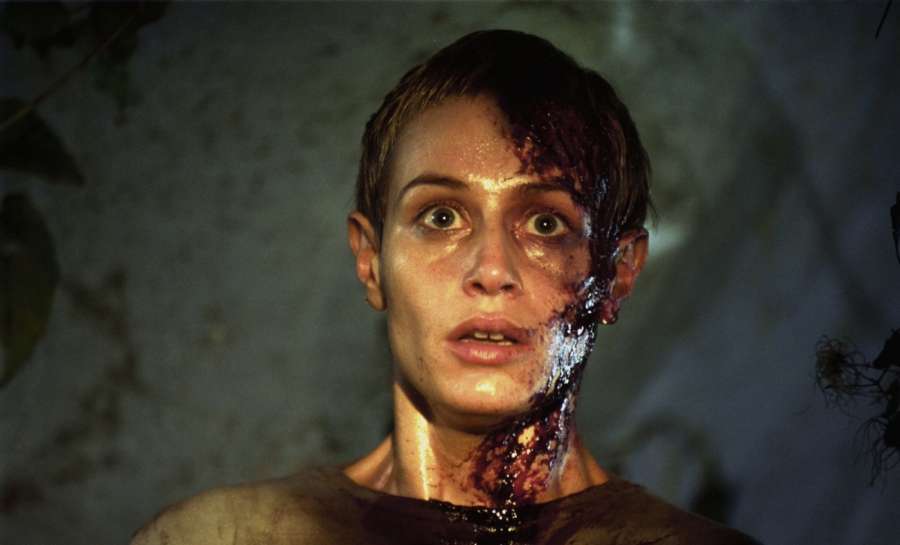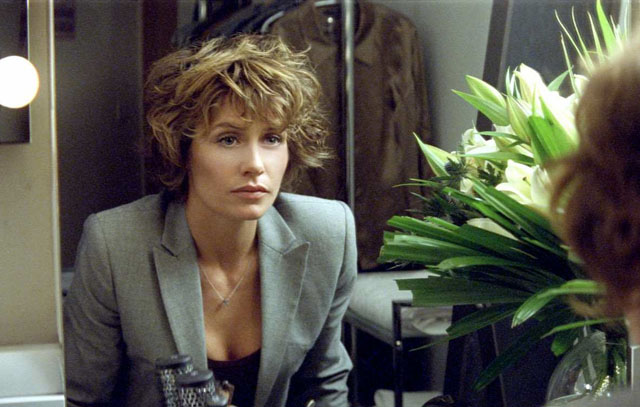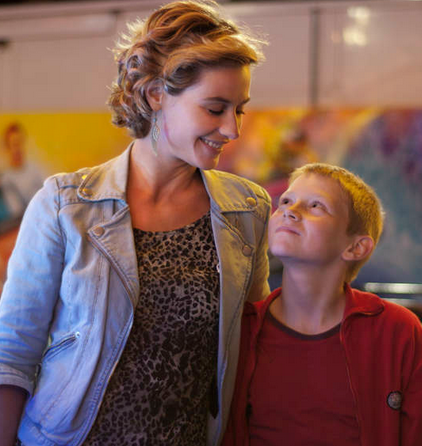Craig here with this week's Take Three. Today: Cécile De France

Take One: Haute tension/Switchblade Romance (2004)
De France brings an entirely new meaning to the term ‘Final Girl’ in Alexandre Aja’s Haute tension (or, to give it its more exploitation-happy title, Switchblade Romance). Spoiler Alert: Although we see Philippe Nahon doing the relentless butchering throughout the film, it emerges toward the end that he’s merely a projection of De France’s Marie’s imagination; he’s the product of pent-up sexual urge in Marie to create a marauding male monster in her mind. It all gets very muddy before becoming incredibly bloody. We witness the farmhouse massacre (the central setting for the film) alongside Marie, and place misguided hopes onto De France to ‘save the day’. With close-cropped hair and slightly (deliberately?) awkward mannerisms suggesting ambiguous duplicity, she's a a striking presence. Some careful direction and judicious editing make the film’s ruse work and ably assist De France to communicate the exact amount of required fear. Her peril is entirely believable when she’s tucked away in a closet ostensibly watching Nahon murder the mother of the house. This high (barbed) wire is even more remarkable after the fact in retrospect. She conveys the final act slide into libido-charged maniacal force with just the right amount of desperate, perplexed kinkiness. Her’s is a three-tiered act in one: she’s victim, saviour and perpetrator. De France physically and emotionally wrenched turn works hard to cautiously hint to one aspect whilst juggling the other two. How many men in horror movies have had to spin those kinds of performance plates?
Take Two: Hereafter (2010)
Clint Eastwood's supernaturally chancy drama Hereafter plods through a series of unconvincing spooky motions for what feels like 75 hours. But at least it has De France in one of the supporting roles. There’s lead Matt Damon chopping tomatoes with Bryce Dallas Howard, a pair of acting-challenged Brit twins and Derek Jacobi seemingly surprised to be playing himself. The only plot strand worth a look is De France’s. She's the best thing in it as Marie Lelay, a French journalist on a Thailand research trip who gets caught up in, and effectively dies during, the 2004 Indian Ocean Tsunami. Her early afterlife experience -- she’s quickly revived! -- means she spends the remainder of the film seeking answers in a lead up to, essentially, a meet-cute with Damon outside Pizza Express.

Peter Morgan’s script pushes her so hard in a singularly spiritual, 'Ooh Look There’s Life After Death!' direction that it feels more like a plot device to get from A-Z more than crucially developed characterisation. But because De France convinces as a woman questioning her place in the world so meaningfully, and with precise, well-conveyed tenderness, her character emerges as thoughtfully compelling anyway. De France is fascinating because of the conviction she imparts in her role. There’s no faff to her work in the scenes as she believably frets and ponders what the script passes her way in a refreshing, organic manner, Hereafter didn’t really need the other narrative strands when it already had an intriguing enough character in Lelay. Had the film solely been about De France’s existentially eerie travels, given a more elusive slant and been directed by, say, Michael Haneke (who she needs to work with soon), a more intelligently satisfying outcome may have been aroused. Still, watching De France battle tsunamis, supernatural spirits and Matt Damon’s advances – and remain remarkably assured throughout – is treat enough.
 Take Three: The Kid with a Bike (2011)
Take Three: The Kid with a Bike (2011)
Until The Kid with a Bike the Dardenne brothers hadn’t used a ‘name’ actor in one of their films (Jérémie Renier, who also turns up here, notwithstanding). De France was a marvellous and apt choice to play Samantha, a woman with a small hairdressing business on the outskirts of Liège, Belgium. She happens to be in a doctor’s waiting room at the wrong (right) time and thus entrusted to look after a waywardly troubled boy, Cyril (Thomas Loret), who randomly clings onto her for safety whilst on the run from his care home. De France was seemingly the first and only choice for the part – she was offered the role soon after the Dardennes had finished the script – and fits into their naturalistic world perfectly. We’re never sure exactly why Samantha decides to take in this kid, and thankfully aren’t, in customary Dardennes fashion, given a weighted backstory to over explain her character. Samantha’s just a woman who does a good thing for another person and De France intuits Samantha’s actions with subtle skill. Her reasons why are all there if we happen to look for them.
The scenes between Loret and De France are some of the film’s best: the emotional exchanges in her car; the arguments at her home/hairdressing shop; the bike ride/picnic in the sun. The way they interact and communicate is real and brim full of sincere affection. De France ensures that Samantha’s maternal instinct isn’t explicitly pronounced. She folds it into her performance through small but telling mannerisms to create a character of real humanistic warmth and tenderness. Over the course of the film we see a parental bond cement itself that’s utterly moving.
Three more films for the taking... L'Auberge espagnole/Pot Luck (2002), Un secret/A Secret (2005), Mesrine: L'instinct de mort/Mesrine: Killer Instinct (2008)
Other Recent Take Threes: Ida Lupino, Toby Kebbell, Piper Laurie, and Anne Heche